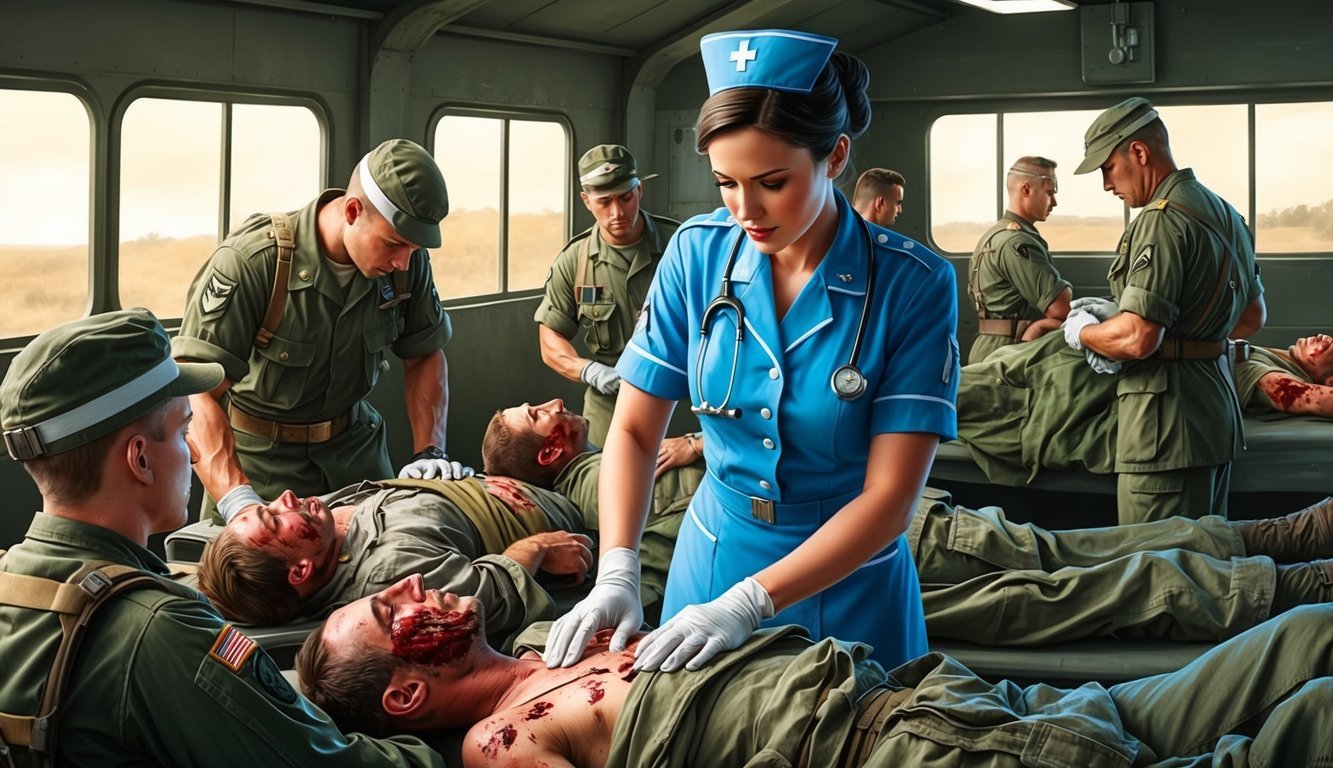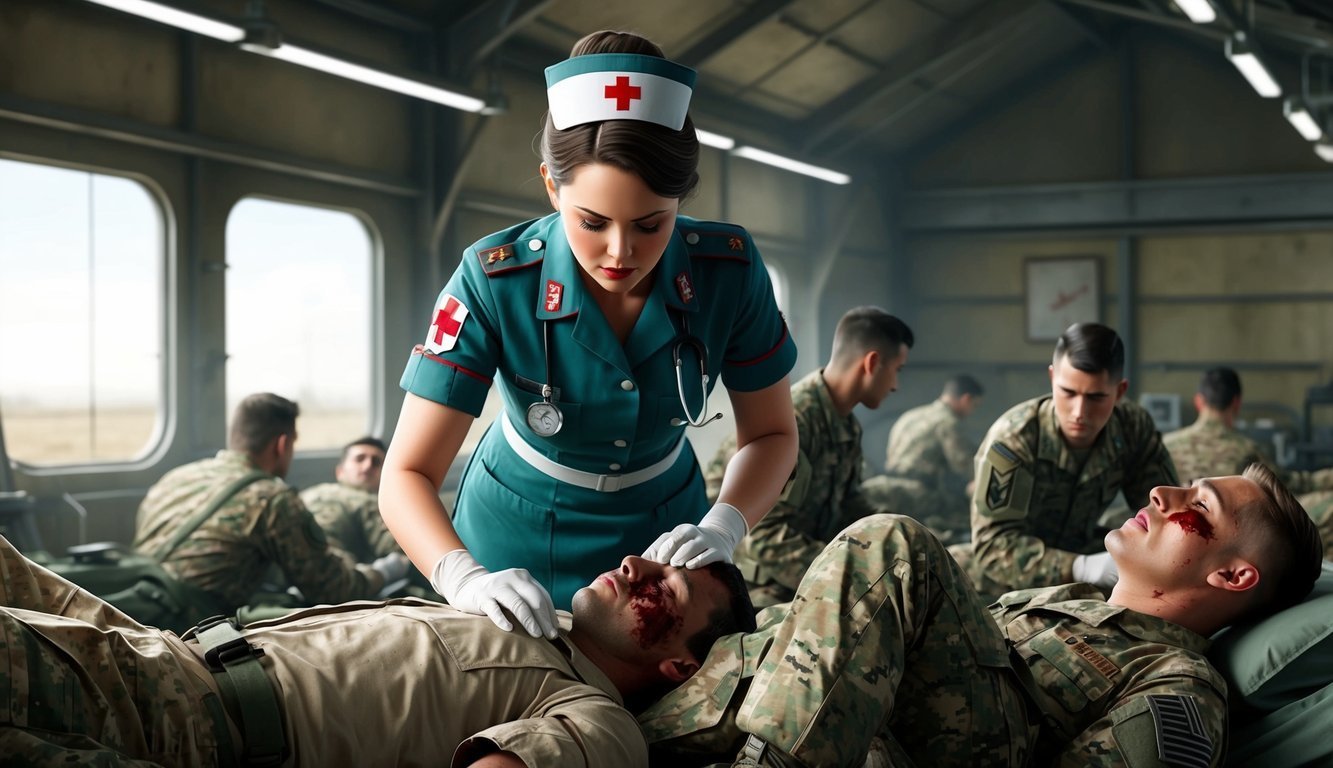Becoming a military nurse offers a unique opportunity to serve your country while providing essential medical care.
Military nursing is not just a job; it’s a commitment to the health and well-being of service members and their families.
Your dedication can lead to a fulfilling career that encompasses both advanced medical training and the chance to make a real difference in high-pressure environments.
As a military nurse, you will operate in various settings, from military hospitals to combat zones, requiring specialized training and a strong sense of duty.
This career path demands resilience and the ability to handle critical situations while ensuring quality care is provided to patients.
With competitive salaries ranging from $61,500 to $132,830 depending on your experience and rank, military nursing can also be a financially rewarding choice.
If you are considering this path, it is vital to understand the educational requirements, including earning a Bachelor of Science in Nursing (BSN) and obtaining necessary certifications.
Explore resources that outline the steps needed to transition into this vital role, such as 6 Steps to Becoming a Military Nurse and details on each branch of military service.
Becoming a Military Nurse
To become a military nurse, you must navigate specific educational requirements, obtain proper licensure, and complete officer training.
This process prepares you for the unique challenges faced in military healthcare environments.
Educational Pathways
Your journey begins with a Bachelor of Science in Nursing (BSN).
This four-year degree equips you with essential nursing skills and knowledge.
If you hold an Associate Degree in Nursing (ADN), you can pursue an RN-to-BSN program, which typically takes 9 to 24 months.
During your bachelor’s program, focus on gaining clinical experience and developing leadership skills, as these are crucial for military settings.
Completing a BSN allows you to qualify to take the NCLEX-RN Exam, the National Council Licensure Examination for Registered Nurses.
Passing this exam is necessary to obtain your nursing license and practice as a registered nurse.
Licensure and Certifications
After earning your BSN and passing the NCLEX-RN, you will receive your Registered Nurse (RN) Licensure.
In addition to this, you may consider obtaining a Military Nurse Certification if you plan to specialize further.
It’s vital to keep abreast of state nursing requirements, as they may vary based on military branch and location.
Continuous education through relevant courses or obtaining a Master of Science in Nursing (MSN) can enhance your skills.
Many military programs also offer scholarships and incentives for further education, making this a favorable option to consider.
Officer Training and Commissioning
As a military nurse, you will become a Commissioned Officer in the Nurse Corps.
After being accepted, you must undergo officer training, which includes leadership development and specialized medical training tailored for military environments.
Military training typically spans several weeks, emphasizing both physical and mental resilience.
Once training is complete, you’ll have the skills necessary to lead in healthcare settings, manage teams, and respond to various military medical situations.
Your training prepares you to deliver high-quality care under challenging conditions, making you an integral part of the military healthcare system.
Roles and Responsibilities

As a military nurse, you play a vital role in providing care to military personnel and their families.
Your responsibilities encompass healthcare delivery, specialized nursing roles, and service in various environments, including combat zones and military hospitals.
Healthcare Delivery in the Military
In military settings, nurses are essential for delivering comprehensive healthcare to active-duty service members, their dependents, and veterans.
You work in various facilities, such as military clinics, hospitals, and trauma centers.
Your responsibilities include:
- Administering medications and treatments.
- Performing assessments and monitoring health changes.
- Educating patients about health maintenance.
Military nurses often handle acute situations, requiring skills such as Advanced Cardiac Life Support (ACLS) and triage to prioritize patient care effectively.
You also collaborate with doctors and specialists to ensure comprehensive treatment plans.
Specialized Nursing Roles
Military nursing offers numerous specialties that align with your interests and career goals.
Depending on your qualifications, you may focus on areas such as:
- Emergency nursing
- Critical care
- Mental health nursing
Each specialty involves unique competencies.
For instance, emergency nurses must excel in rapid assessment and decision-making in urgent situations.
On the other hand, mental health nurses provide critical support for service members facing psychological challenges.
These roles require continuing education and training to maintain high standards of care within the U.S. Armed Forces.
Deployment and Combat Zones
Deployment is a significant aspect of military nursing.
You may find yourself stationed in combat zones, where medical response is often immediate and dynamic.
Your duties in these environments include:
- Providing trauma care under pressure.
- Conducting medical evacuations.
- Managing resource constraints.
In combat zones, you utilize your training to assess and treat wounds, administer resuscitation, and perform procedures in challenging conditions.
Understanding the basics of field medicine and adapting to the environment is crucial for effective patient care in these scenarios.
Military nurses play a pivotal role in enhancing the overall readiness and health of military personnel during deployment.
Career Advancement and Education
For military nurses, advancing in your career requires a commitment to ongoing education and professional development.
Understanding the pathways for further education and specialization is crucial for optimizing your role and enhancing your skills.
Continuing Education Opportunities
Engaging in continuing education is essential for maintaining your nursing license and staying current with medical advancements.
Many military nurses pursue further education through programs that offer specialized training in areas such as emergency nursing and trauma nursing.
You can also participate in workshops, conferences, and online courses to obtain Continuing Education Units (CEUs).
This not only fulfills licensing requirements but also broadens your expertise and prepares you for leadership roles.
Exploring options such as the BSN Program can enhance your qualifications and opportunities for advancement.
Professional Development Programs
Professional development programs tailored for military nurses provide targeted training that aligns with military healthcare needs.
These programs often focus on leadership and management skills crucial for roles such as Clinical Nurse or Nurse Educator.
Workshops and seminars offered by the Army Nurse Corps can help you develop competencies in critical areas.
Engaging in mentorship programs is another beneficial experience that fosters professional growth and offers networking opportunities.
Advanced Practice and Specializations
Consider pursuing advanced degrees such as a Master of Science in Nursing (MSN) to elevate your career further.
With an MSN, you may specialize as a Nurse Practitioner or Nurse Anesthetist, allowing you to provide advanced care and take on more responsibilities.
Certifications in specialized fields, such as Critical Care Nurse, can also enhance your qualifications.
Many military facilities provide support for obtaining these certifications, which can significantly increase your earning potential and career options.
Military Nurse Lifestyle
The lifestyle of a military nurse encompasses unique work-life dynamics, benefits, and challenges.
Understanding these aspects can help you evaluate the demands and rewards of this profession.
Work-Life Balance and Benefits
As a military nurse, your work-life balance can vary significantly depending on your branch, such as the Army, Navy, or Air Force.
Regular hours may be disrupted due to deployment, which can last from months to over a year.
These periods demand adaptability, yet they also come with benefits.
You may receive various benefits, including:
- Sign-on Bonuses: Attractive initial bonuses encourage recruitment.
- Vacation Days: You gain paid time off, which varies by rank and years of service.
- Retirement Plans: Military careers offer robust retirement plans with long-term financial security.
Physical fitness is also a priority, with regular training sessions required to maintain your readiness.
This commitment to health often fosters camaraderie with peers, enhancing your support network.
Challenges and Rewards
The job of a military nurse includes numerous challenges.
High-stress situations, especially during deployment, demand quick decision-making and resilience.
Working in diverse environments may also mean you face unique medical situations that require rapid adaptability.
Despite these challenges, rewards are significant.
You are part of a team that plays a crucial role in providing medical care to soldiers and their families.
The military nursing career offers a respectable salary, which often includes hazard pay during challenging assignments.
Your rank within the military ranking system affects both responsibilities and salary, providing clear paths for advancement.
The job outlook for military nurses remains positive, with ongoing demand for skilled professionals as military healthcare systems evolve.
Support Structures and Resources
Military nurses have access to a range of support structures and resources to enhance their careers and well-being.
These resources include financial aid programs, mental health services, and support during the transition to civilian healthcare roles.
Student Loan Repayment and Financial Aid
Many military nurses benefit from programs such as the Student Loan Repayment Program, which can assist in paying off student loans.
This incentive is particularly beneficial for those pursuing advanced nursing degrees or specialized training.
The military also offers financial assistance through scholarships and grants, designed specifically for nursing students.
For example, the Health Professions Scholarship Program (HPSP) provides funding for nursing education in exchange for service commitment.
In addition, resources like Maxwell AFB offer guidance on navigating financial aid options, ensuring you make informed decisions about your education and career financing.
Mental Health Services and Community Support
Mental health is crucial for the well-being of military nurses.
Support services such as counseling and peer support groups are available to help you cope with stress and other challenges.
Organizations like the V.A. Hospitals provide comprehensive mental health resources tailored for healthcare workers, including nurses.
Community support networks, including local veteran organizations, also play a vital role in fostering a healthy environment.
These networks can connect you with fellow military personnel, providing camaraderie and shared experiences.
Accessing these resources can significantly enhance resilience and mental health, allowing you to thrive both personally and professionally.
Transition to Civilian Health Care Roles
Transitioning from military to civilian nursing can present unique challenges.
Various programs facilitate this change.
For example, the Basic Officer Leader Course prepares military nurses for civilian roles while enhancing leadership skills.
You may also explore opportunities at V.A. Hospitals and other healthcare institutions that value military experience.
Additionally, programs tailored for veterans facilitate the recognition of your skills and certifications.
Networking events and job fairs specifically aimed at military nurses can provide further assistance.
These resources ensure that your military experience is recognized and valued in civilian roles.

